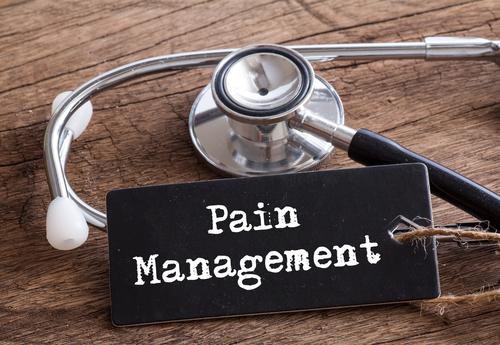7 Tips for Managing Your Pain
Written by |

I’d been anticipating my bilateral cochlear implant surgery for more than a year. I knew it required some drilling into my skull, cuts behind the ear, and having devices shoved into my cochlea. I did not expect to be restricted to Tylenol for pain relief afterward.
Just a week before surgery, I was informed that damage to my kidneys from antibiotic and lung transplant medication meant I would be limited in the painkillers I could take. But I’ve been completely deaf for a year and a half and it hasn’t been all peaches and unicorns. Bad, big-time. So I figured a couple of weeks of intense pain was a small price for hearing again.
I am fighting through the burning, aching, and stabbing to share exactly how I am able to fight through the burning, aching, and stabbing. Frankly, cystic fibrosis is a painful disease and we could all use a little help with releasing the burden of pain at some point.
Tips for managing your pain
- Smile.
Not to look tough or because I’m losing my sanity, but because it makes me feel less stressed. It’s scientifically proven — your mood follows your mouth muscles’ lead, like a horse follows the reins. Sometimes, I even take it up a notch and laugh at myself. Last night, I was feeling so in the dumps about having to refill my medication case for the week while dealing with this pain. Life was just too tough — how could I focus on pouring these little capsules into plastic slots for 15 minutes? Dude. You just had a lung transplant in January, your chest got split open, and you had to relearn to walk and breathe. It’s literally laughable that I see filling a med case as an impossible challenge. So I laughed out loud and stuck those suckers into their plastic slots.
- “Rub some dirt on it! Builds character!”
Don’t really rub dirt on any wounds. That’s not sanitary. No, these are the wise, metaphoric words of my father, a retired soldier. Repeated so often through IV placements, toe stubs, pulled muscles, and various frightening medical procedures. It’s a half-joke, but it has helped me. Every time I go through pain, I focus on how much more easily and patiently I’ll be able to handle future suffering. Kind of like my example of the lung transplant making everything seem easier in comparison. Any time I feel I can’t handle the pain, I can say, “Hey, at least it’s not as bad as the time the docs shoved a…” OK, never mind. You don’t want to read about that.
- Split the senses.
Try to separate the broadness of the pain into more approachable sensory terms. Is it throbbing? Is it hot or cold? Don’t focus on the hurt. Instead, focus on the sensation of throbbing or heat. It makes the pain seem less concrete and more imaginary. Psychologists call this “sensory splitting.” The sensations aren’t a thing anymore, they’re just passing experiences. It’s weird, but it can work.
- Meditate.
If I’m not getting too metaphysical for you with the last advice, try some meditation, too. Get an image in your mind of a place you feel relaxed. Maybe the beach? Take it from an image to an experience. Can you smell it? (Maybe light some candles if you have a bad imagination.) Can you hear it? (Insert joke about me being deaf.) More importantly: Can you feel it? Don’t think about the throbbing in your head. Think about the warm, grainy sand trickling between your toes as you stretch them into the shoreline. Focus on your toes, man. Your whole body isn’t in pain. You’re just choosing to focus on that pain. But don’t. Focus on the dozens of other sensations your body is experiencing. If you know self-hypnosis techniques, implement those.
- Think scientifically.
Kind of the opposite of the third and fourth tips, but it may work. Instead of thinking of abstract things, focus on the idea that your pain is merely a bunch of nerves acting up. It seems less doom-y when you realize it’s just a bunch of cells in your body throwing a fuss. Roll your eyes at the cells and sigh.
- Distract yourself.
Do some light exercise to release natural endorphins that can block pain signals. Or do some other hobby that relaxes you, whether that’s zoning out to Netflix or reading that Harry Potter book for the millionth time. Heck, I just realized I haven’t noticed my pain since I began writing this!
- Just take the painkillers, dude.
Thankfully, many can take painkillers because they don’t have kidney problems. Don’t be stubborn for the sake of acting tough. But try the other tips first, because natural healing is always preferable. And never take more than you need. Happy healing!
***
Note: Cystic Fibrosis News Today is strictly a news and information website about the disease. It does not provide medical advice, diagnosis, or treatment. This content is not intended to be a substitute for professional medical advice, diagnosis, or treatment. Always seek the advice of your physician or other qualified health provider with any questions you may have regarding a medical condition. Never disregard professional medical advice or delay in seeking it because of something you have read on this website. The opinions expressed in this column are not those of Cystic Fibrosis News Today or its parent company, Bionews Services, and are intended to spark discussion about issues pertaining to cystic fibrosis.








Leave a comment
Fill in the required fields to post. Your email address will not be published.